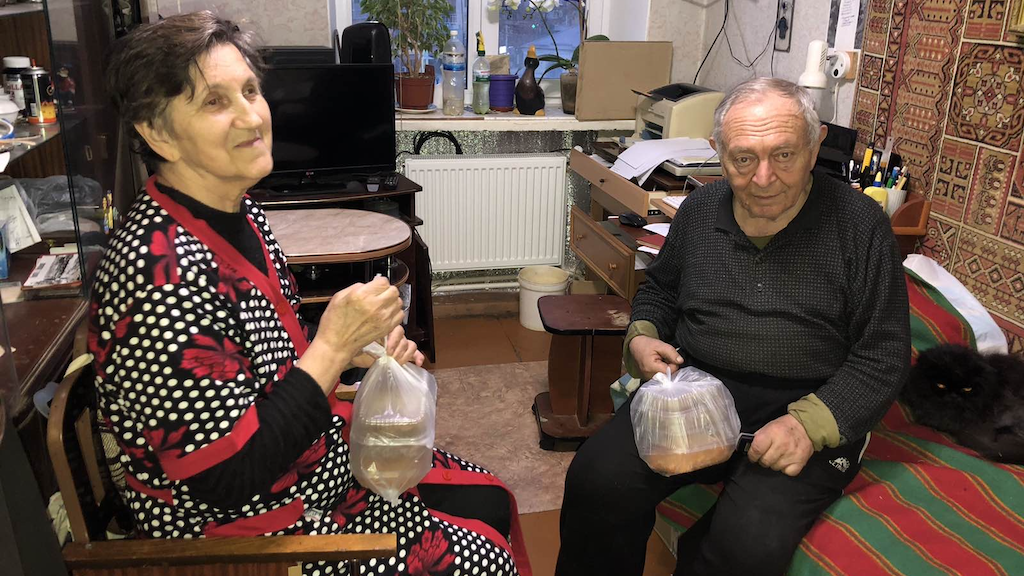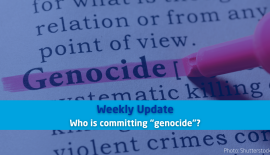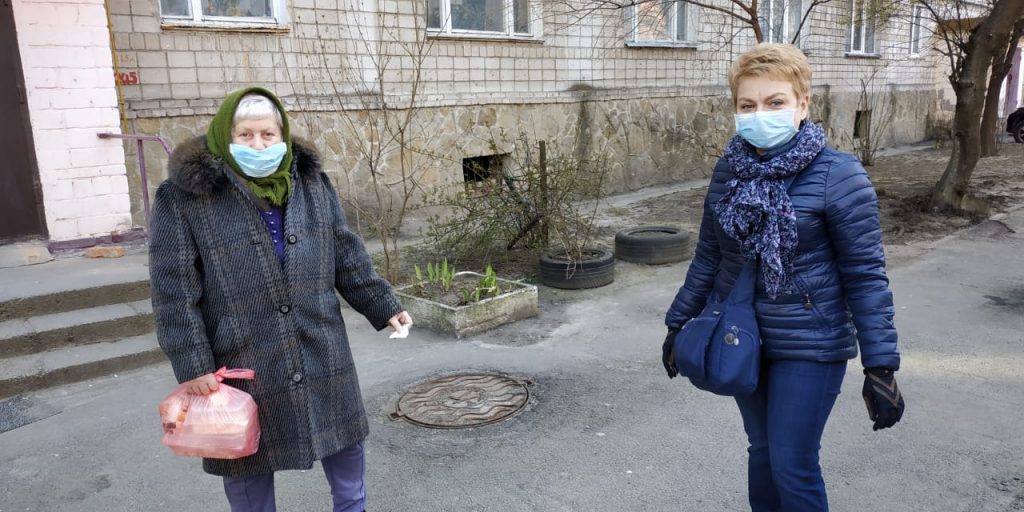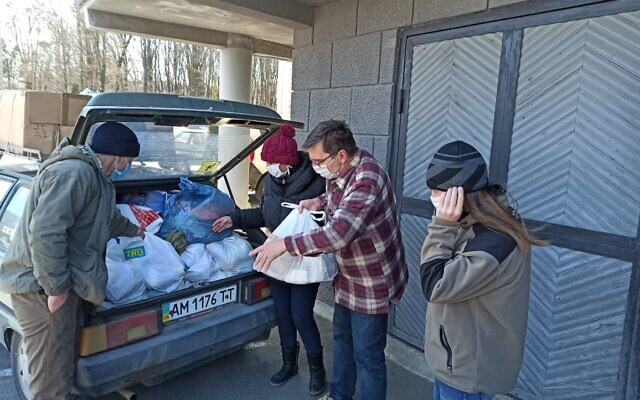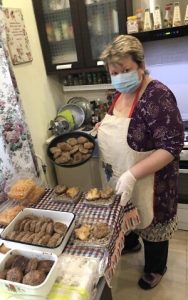In Ukraine, Christian group steps in to feed needy Jews confined by COVID-19
This article was first published in the Times of Israel: go to article
While poverty-stricken Ukraine scrambles to get a hold on the coronavirus, a Christian organization is stepping in to provide immediate food aid to elderly Jews confined by the pandemic to their homes.
With it usual activities to encourage immigration to Israel now suspended, Christians for Israel, a Dutch-based organization that supports aliyah and distributes food parcels to needy Jews in around 100 Ukrainian locales, is using all of its vans, staff and volunteers to deliver food wherever Jews need it, particularly as many soup kitchens have had to close under virus restrictions.
As of Thursday, Ukraine’s State Emergency Service was reporting 162 confirmed coronavirus cases, with various regions including the capital, Kyiv, affected.
Worst hit so far is the city of Chernivtsi, with 42 confirmed cases, one death and one recovery. Chernivtsi, in south western Ukraine, is known to Jews worldwide by its Austro-Hungarian empire name of Czernowitz. It was once the capital of Bukovina and a hub of Jewish culture. Jews made up around 40 percent of its population before World War ll. With its beautiful architecture and once thriving cultural life, it was known as the Vienna of the East.
On Wednesday, the Ukrainian government extended a national emergency to the whole country for 30 days and deepened lockdown measures.
Police have set up roadblocks at the entrances to cities and town.
The numbers of Jews still living in Ukraine is estimated at anything from 120,000 to 400,000 people.
Many are elderly and include close to 40% of all the former Soviet Union’s Holocaust survivors, according to the Claims Conference.
During World War ll, an estimated 1.5 to 1.6 million out of 2.7 million Jews living in shtetl villages and market towns across the country perished.
That is one in every four of all Holocaust victims in Europe.
The country’s best known memorial is at Babi Yar.
Christians for Israel works closely with the Hesed community welfare centers set up by the American Jewish Joint Distribution Committee, with the Chabad movement, and with the leaders of small Jewish communities throughout the country.
It is currently either taking meals on wheels or sending money to Jewish institutions to cook and distribute the food themselves in 20 major cities and the areas around.
In Vinnitsa, in west-central Ukraine, for example, Christians for Israel stepped in with meals on wheels after a Hesed soup kitchen serving 50 people had to close because of the pandemic.
Over the coming two months, the organization aims to deliver more than 300,000 meals throughout the country.
“Requests keep on coming as the news of our service is spreading,” Koen Carlier, the organization’s Ukraine director, told The Times of Israel Wednesday. “Food prices in the stores have risen by up to 40%, and these elderly people have no income and very small pensions.”
His wife, Ira, said that they started with 20 people in Vinnitsa. This has grown to 60, and “the calls keep coming in.”
Details about non-Jewish callers are passed on to the local church, which is also delivering meals.
Ira’s brother is a senior doctor at a Vinnitsa hospital.
“The country is just not prepared for an outbreak of coronavirus, Italy-style,” Ira said. “He thinks that about 80% of the population will get this virus, including us. Our system of medical care is poor enough without it. There are not enough hospitals — they’re concentrated in the big cities — and while there are still trams in the cities, there’s no transport anymore between the cities and the villages. They’re telling villagers who get sick to stay at home and phone, but many villages have no cellphone connection.”
In Ukraine, more than 30% of the population is rural.
Ira continued, “Where there are hospitals, there’s not enough equipment such as ventilators, medicines and protective clothing, and the people here have neither medical insurance nor national insurance. You have to pay for medical care.”
Out of a population of around 42 million, some seven million Ukrainians work overseas because of the difficulties of making ends meet at home. Many who have lost their jobs because of the virus have been returning in droves. In the beginning, they were not ordered into isolation. Now they are, but many of those coming home live in villages. While police have set up roadblocks in the cities and can enforce isolation to an extent, the villages — in a country roughly the size of Texas — are left more or less on their own.
Lack of trust in official information is a further complicating factor. Traumatized by events such as the Chernobyl nuclear reactor meltdown in 1986, when the then Soviet-appointed rulers kept the population in the dark, people wonder whether the coronavirus figures are hugely underestimated.
“We don’t know the true numbers,” Ira said. “Just yesterday, they announced the first case of coronavirus in our city. But we only recently got tests. People have been dying of pneumonia but we’ve had no way of knowing what was causing it.”
Rabbi Pinchas Vishedksi, an Israeli-born Chabad emissary in Ukraine since 1993, served as a community rabbi in eastern Ukraine’s Donetsk until August 2014, when he and most of his congregation fled the Russian takeover there. Those who didn’t fly to Israel settled in Kyiv.
Still very much in touch with the roughly 3,000, mainly old and needy, Jews still in Donetsk city — down from around 15,000 before the Russian invasion — he told The Times of Israel that the pro-Russian authorities there are keeping vital coronavirus-related information away from citizens.
“The tragedy is being hidden from the citizens,” he said. “It appears that the [pro-Russian] republics there don’t know how to deal with it. It seems to be the only place on earth other than Belorussia, which is also ruled by a dictator, where few precautions are being taken. I understand that they closed the schools in Donestk today, but life, work and entertainment in the city continues.
“We need to explain to the Jews there that it’s dangerous to be on the streets. They don’t understand. We might as well be talking Chinese. Koen Carlier told us we must close the soup kitchen there and it was hard to explain to people why they should stop coming.
“But we closed it and are now cooking meals that are being taken daily to people’s homes.”
Vishedksi, whose Kyiv congregation numbers hundreds of families from all over the country, including refugees from the east, said no communal Passover Seders would be held in Donetsk — or in Kyiv — and that instead, kits were being distributed.
Around three tons (3,000 kg) of matzos were being brought into Donetsk from Russia for the kits, along with grape juice from Georgia, Haggadot [books telling the story of the Exodus from Egypt] and Seder instruction leaflets. Young people were picking them up from the Donetsk synagogue and delivering them.
In Kyiv, where all the synagogues have shut, people were feeling “very stressed,” Vishedksi said.
Despite the government’s instructions, large numbers of people were still on the streets.
“The first thing that happened here was that the privately owned food stores raised their prices, as did the pharmacies, for sanitizing products,” he said. “There’s no price supervision. People who have been put on unpaid leave have nothing to fall back on. It’s a catastrophe.”
As part of his synagogue’s attempts to provide accurate information on the pandemic, the rabbi has recruited a senior doctor to answer coronavirus-related questions via Facebook once a day.
The coronavirus only compounds Ukraine’s multiple problems.
According to a USAID report updated on March 16, Ukraine has among the highest rates of HIV/AIDS in Eastern Europe, and close to the highest rate of multi-drug resistant tuberculosis (MDR-TB) globally.
It also has among the lowest rates of routine immunization in the world due to a lack of available vaccines and distrust of vaccination by parents and medical providers.
The country has an estimated 100,000 orphans, around 80% of whom are described as “social orphans” whose parents are either too poor, abusive, drunk or high on drugs to raise them.
Huge wealth gaps persist between the majority of poor to just-about-managing and the so-called oligarchs, who lined their pockets in the early post-Soviet years by snapping up privatized industries.
